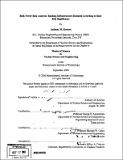Bulk power risk analysis : ranking infrastructure elements according to their risk significance
Author(s)
Koonce, Anthony M
DownloadFull printable version (4.494Mb)
Other Contributors
Massachusetts Institute of Technology. Dept. of Nuclear Science and Engineering.
Advisor
George E. Apostolakis.
Terms of use
Metadata
Show full item recordAbstract
Disruptions in the bulk power grid can result in very diverse consequences that include economic, social, physical, and psychological impacts. In addition, power outages do not affect all end-users of the system in the same manner. For these reasons, a risk analysis of bulk power systems requires more than determining the likelihood and magnitude of power outages; it must also include the diverse impacts power outages have on the users of the system. We propose a methodology for performing a risk analysis on the bulk power system. A power flow simulation model is used to determine the likelihood and extent of power outages when components within the system fail to perform their designed function. The consequences associated with these failures are determined by looking at the type and number of customers affected. Stakeholder input is used to evaluate the relative importance of these consequences. The methodology culminates with a ranking of each system component by its risk significance to the stakeholders. The analysis is performed for failures of infrastructure elements due to both random causes and malevolent acts.
Description
Thesis (S.M.)--Massachusetts Institute of Technology, Dept. of Nuclear Science and Engineering, 2006. Includes bibliographical references (p. 50-52).
Date issued
2006Department
Massachusetts Institute of Technology. Department of Nuclear Science and EngineeringPublisher
Massachusetts Institute of Technology
Keywords
Nuclear Science and Engineering.